| Tennis at the 2002 Central American and Caribbean Games | |
|---|---|
 | |
| Location | San Salvador |
The tennis competition at the 2002 Central American and Caribbean Games was held in San Salvador, El Salvador.
| Tennis at the 2002 Central American and Caribbean Games | |
|---|---|
 | |
| Location | San Salvador |
The tennis competition at the 2002 Central American and Caribbean Games was held in San Salvador, El Salvador.
| Event | Gold | Silver | Bronze |
|---|---|---|---|
| Singles | |||
| Doubles | and Santiago González (MEX) | and Carlos Salamanca (COL) | and Troy Stone (TRI) and Jimy Szymanski (VEN) |
| Team Event | Bruno Echagaray Miguel Gallardo Santiago González (MEX) | Jhonson García (DOM) | Kepler Orellana Jimy Szymanski (VEN) Pablo González Michael Quintero Carlos Salamanca (COL) |
| Event | Gold | Silver | Bronze |
|---|---|---|---|
| Singles | |||
| Doubles | and Mari Toro (PUR) | and Melissa Torres Sandoval (MEX) | and Stephanie Schaer (VEN) and Ana Osorio (ESA) |
| Team Event | Vilmarie Castellvi (PUR) | Alejandra Rivero Melissa Torres Sandoval (MEX) | Daisy Espinal Diana Espinal (DOM) Ana Osorio Marcela Rodezno (ESA) |
| Event | Gold | Silver | Bronze |
|---|---|---|---|
| Doubles | and Kristina Brandi (PUR) | and Melissa Torres Sandoval (MEX) | and Neyssa Etienne (HAI) and Stephanie Schaer (VEN) |

Central America is a subregion of North America. Its political boundaries are defined as bordering Mexico to the north, Colombia to the southeast, the Caribbean Sea to the east, and the Pacific Ocean to the southwest. Central America is usually defined as consisting of seven countries: Belize, Costa Rica, El Salvador, Guatemala, Honduras, Nicaragua, and Panama. Within Central America is the Mesoamerican biodiversity hotspot, which extends from southern Mexico to southeastern Panama. Due to the presence of several active geologic faults and the Central America Volcanic Arc, there is a high amount of seismic activity in the region, such as volcanic eruptions and earthquakes, which has resulted in death, injury, and property damage.
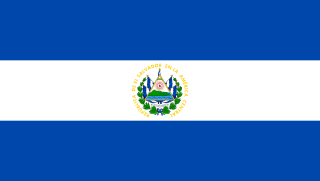
El Salvador, officially the Republic of El Salvador, is a country in Central America. It is bordered on the northeast by Honduras, on the northwest by Guatemala, and on the south by the Pacific Ocean. El Salvador's capital and largest city is San Salvador. The country's population in 2023 was estimated to be 6.5 million.

Salvador Domingo Felipe Jacinto Dalí i Domènech, Marquess of Dalí of Púbol, known as Salvador Dalí, was a Spanish surrealist artist renowned for his technical skill, precise draftsmanship, and the striking and bizarre images in his work.
The history of El Salvador begins with several distinct groups of Mesoamerican people, especially the Pipil, the Lenca and the Maya. In the early 16th century, the Spanish Empire conquered the territory, incorporating it into the Viceroyalty of New Spain ruled from Mexico City. In 1821, El Salvador achieved independence from Spain as part of the First Mexican Empire, only to further secede as part of the Federal Republic of Central America two years later. Upon the republic's independence in 1841, El Salvador became a sovereign state until forming a short-lived union with Honduras and Nicaragua called the Greater Republic of Central America, which lasted from 1895 to 1898.

San Salvador is the capital and the largest city of El Salvador and its eponymous department. It is however the country's largest agglomeration. It is the country's political, cultural, educational and financial center. The Municipality of San Salvador has 525,990 inhabitants (2024). The Metropolitan Area of San Salvador, which comprises the capital itself and 13 of its municipalities, has a population of 2,404,097. The urban area of San Salvador has a population of 1,600,000 inhabitants.

Óscar Arnulfo Romero y Galdámez was a prelate of the Catholic Church in El Salvador. He served as Auxiliary Bishop of the Archdiocese of San Salvador, the Titular Bishop of Tambeae, as Bishop of Santiago de María, and finally as the fourth Archbishop of San Salvador. As archbishop, Romero spoke out against social injustice and violence amid the escalating conflict between the military government and left-wing insurgents that led to the Salvadoran Civil War. In 1980, Romero was shot by an assassin while celebrating Mass. Though no one was ever convicted for the crime, investigations by the UN-created Truth Commission for El Salvador concluded that Major Roberto D'Aubuisson, a death squad leader and later founder of the right-wing Nationalist Republican Alliance (ARENA) political party, had ordered the killing.

The Federal Republic of Central America, initially known as the United Provinces of Central America, was a sovereign state in Central America which existed from 1823 to 1839/1841. The Federal Republic of Central America was composed of five states: Costa Rica, El Salvador, Guatemala, Honduras, and Nicaragua, as well as a Federal District from 1835 to 1839. Guatemala City was the federal republic's capital city until 1834, when the seat of the federal government was relocated to San Salvador. The Federal Republic of Central America was bordered to the north by Mexico, to the south by Gran Colombia, and on its eastern coastline by the Mosquito Coast and British Honduras.

The Farabundo Martí National Liberation Front is a Salvadoran political party and former guerrilla rebel group.

The Persistence of Memory is a 1931 painting by artist Salvador Dalí and one of the most recognizable works of Surrealism. First shown at the Julien Levy Gallery in 1932, since 1934 the painting has been in the collection of the Museum of Modern Art (MoMA) in New York City, which received it from an anonymous donor. It is widely recognized and frequently referred to in popular culture, and sometimes referred to by more descriptive titles, such as "The Melting Clocks", "The Soft Watches" or "The Melting Watches".
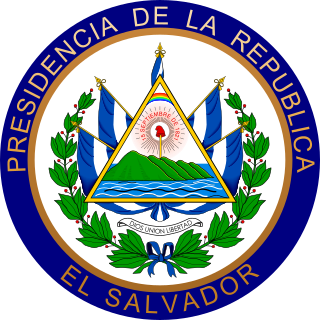
The president of the Republic of El Salvador is the head of state and head of government of El Salvador. The president is also the commander-in-chief of the Armed Forces of El Salvador.
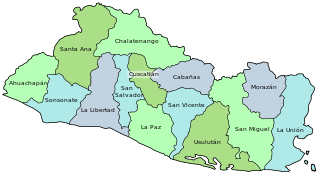
El Salvador is divided into 14 departments for administrative purposes, subdivided into 44 municipalities (municipios) and 262 districts. The country is a unitary state.

The El Salvador national football team, known as La Selecta, represents El Salvador in international football, and is governed by the Salvadoran Football Federation (FESFUT).
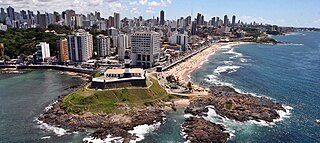
Salvador is a Brazilian municipality and capital city of the state of Bahia. Situated in the Zona da Mata in the Northeast Region of Brazil, Salvador is recognized throughout the country and internationally for its cuisine, music, and architecture. The African influence in many cultural aspects of the city makes it a center of Afro-Brazilian culture. As the first capital of Colonial Brazil, the city is one of the oldest in the Americas. Its foundation in 1549 by Tomé de Sousa took place on account of the implementation of the General Government of Brazil by the Portuguese Empire.
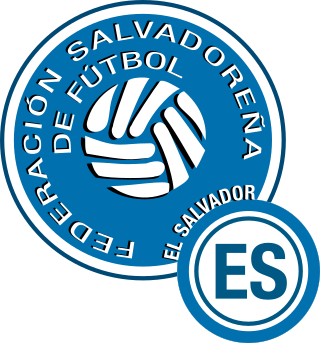
The Salvadoran Football Federation is the official governing football organization in El Salvador and is in charge of the El Salvador national football team, and El Salvador national beach soccer team. The federation is also in charge of the three tiers of domestic club competition, including the top-flight Primera División de Fútbol Profesional.
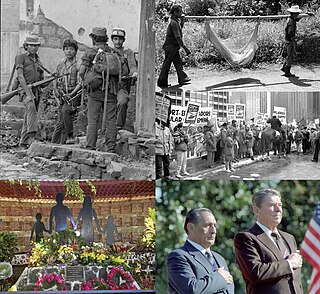
The Salvadoran Civil War was a twelve-year period of civil war in El Salvador that was fought between the government of El Salvador and the Farabundo Martí National Liberation Front (FMLN), a coalition or "umbrella organization" of left-wing groups backed by the Cuban regime of Fidel Castro as well as the Soviet Union. A coup on 15 October 1979 followed by government killings of anti-coup protesters is widely seen as the start of civil war. The war did not formally end until after the collapse of the Soviet Union, when, on 16 January 1992 the Chapultepec Peace Accords were signed in Mexico City.

Maja Ross Andres Salvador-Ortega is a Filipino actress and television personality. Known for portraying strong female leads in revenge dramas in film and television, she has been described as one of the best actresses of her generation. Her accolades include an Asia Contents Award, a FAMAS Award, a Gawad Urian Award, a Luna Award and a PMPC Star Awards for Movies, including nominations from Asian Television Awards and Asian Academy Creative Awards.

Salvadorans, also known as Salvadorians, are citizens of El Salvador, a country in Central America. Most Salvadorans live in El Salvador, although there is also a significant Salvadoran diaspora, particularly in the United States, with smaller communities in other countries around the world.
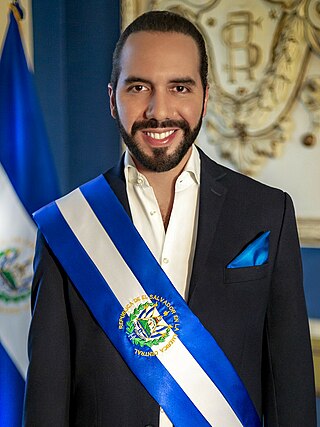
Nayib Armando Bukele Ortez is a Salvadoran politician and businessman who has been the 81st president of El Salvador since 1 June 2019. As a member of the Nuevas Ideas political party, Bukele is the first Salvadoran president since 1989 who was not elected as a candidate of one of the country's two major political parties: the right-wing Nationalist Republican Alliance (ARENA) and the left-wing Farabundo Martí National Liberation Front (FMLN), of which Bukele had previously been a member. He is the first Salvadoran president to be re-elected since 1944.
The COVID-19 pandemic in El Salvador was a part of the worldwide pandemic of coronavirus disease 2019 caused by severe acute respiratory syndrome coronavirus 2. The virus was confirmed to have reached El Salvador on 18 March 2020. As of 19 September 2021, El Salvador reported 102,024 cases, 3,114 deaths, and 84,981 recoveries. As of that date El Salvador had arrested a total of 2,424 people for violating quarantine orders, and 1,268,090 people had been tested for the virus. On 31 March 2020, the first COVID-19 death in El Salvador was confirmed.

The Hospital El Salvador is a major hospital in San Salvador, El Salvador, which was planned to be the largest hospital in Latin America. The first phase was constructed between March and June 2020 as a conversion of the International Fair and Convention Center and formed part of El Salvador's response to the COVID-19 pandemic, exclusively receiving COVID-19 patients. Originally intended to be temporary, it was announced in June 2020 that the hospital conversion would be made permanent. In its first phase, the hospital has 400 available beds, a number which was expected to increase to 2,000 total beds upon completion of phase 3 of construction. However, phase 3 was not opened as a hospital and instead served as a vaccination facility. With the decline of the pandemic, the facility has been announced as the home for a new medical school and also houses offices for the Salvadoran health ministry.